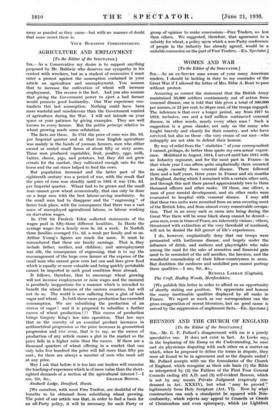WOMEN AND WAR - [To the Editor of the SPECTATOR.]
SIR,—As an ex-Service man aware of your many Ameriean readers, I should be lacking in duty to my comrades of the Great War if I allowed the letter of Mrs. Ettie A. Rout to pass Without protest.
Assuming as correct the statement that the British Army. maintained 50,000 soldiers continuously out of action frOm 4enereal disease, one is told that this gives a total of 500,000 per annum, or 25 per cent. to 30 per cent. of the troops engaged: The inference is that over a longer period, say from 1917 to 1919, inclusive, one and a half million contracted venereal disease, .in-other words, nearly every other man ! Such ri suggestiori is a gross slander, not only on the many who fought bravely and cleanly for their country, and who have survived, but also on those—the very cream of our race—who unhappily are not able to defend their honour.
By way of relief from the " statistics " of your correspondent I cannot, perhaps, do better than quote my own actual experi, ence. Mobilized in August, 1914, I served until late 1915 with an Infantry regiment, and for the most part in France—in that whole year I can affirm quite emphatically there occurred no single casualty from- venereal disease. There followed three and a half years, three years in France and six. months in England, during which I remained with a certain other unit, and through this unit there passed approximately two to three thousand officers and other ranks. Of these, one officer, a man of poor mental development, and six other ranks were evacuated to hospital with venereal disease. I may add that these two units were recruited from an area covering most of the British Isles, and from almost every conceivable occupa. tion. That in an army such as came into being during the Great War there will be some black sheep cannot be denied— some men, even in times of Peace, are inherently vicious.; others, threatened with extinction at the very threshold of manhood, will not be denied the full gamut of life's experiences..
I do, however, emphatically deny that our troops were permeated with loathsome disease, and largely under the influence of drink, and authors and playwrights who rake among the mud for the sake of sensation and financial gain need to be reminded of the self sacrifice, the heroism, and the wonderful comradeship of their fellow-countrymen in arms. But doubtless the mediocre and unskilled pen cannot portray these qualities.—I am, Sir, &c., RUSSELL LATHAM (Captain). The Croft, Hadley Woods, Hertfordshire.
[We publish this letter in order to afford us an opportunity of shortly stating our position. We appreciate and honour the many inestimable qualities displayed by all ranks in France. We regret as much as our correspondent can the gross exaggeration of recent literature, but no good cause is served by the suppression of unpleasant facts.—En. Spectator.]








































 Previous page
Previous page